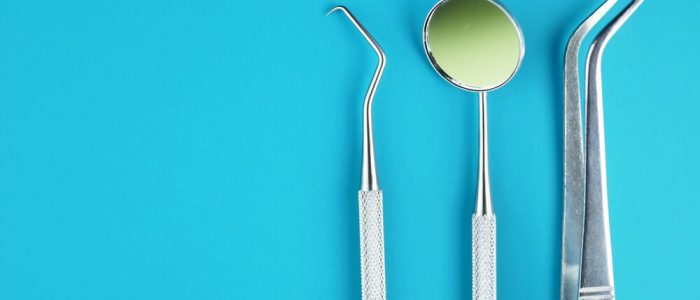Dental Tools & Equipment FAQs
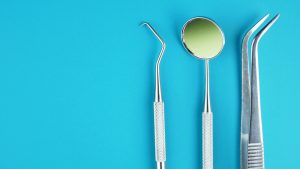
We’ve all seen dentistry tools lined up on a tray right next to your head when you’re visiting your local dentist’s office. But what are they used for and why?
In today’s post, Northside Dental Clinic in Springfield, Missouri, will cover some of the most frequently asked questions regarding the various dental tools and dentistry equipment used in most, if not all, dental offices.
Table of Contents
What Kinds of Dental Tools are There?
Dental instruments vary greatly based on particular dental treatment and procedure. There are tools to examine, manipulate, restore, treat or remove teeth and adjacent oral structures.
What are Tooth Scrapers?
Otherwise known as “dental scrapers,” these are used during “dental scaling,” when a hygienist scrapes off plaque and tartar from the tooth’s surface.
What are Tooth Polishers?
After scaling, tooth polishers are used to smooth the surface of your teeth and give them a brighter appearance.
What are Mirror Lights?
Dental mirror lights are what you get when you combine an LED light source and a standard intraoral mirror. These are commonly used to better spot hard-to-see areas of the mouth.
Dental tools are classified into three basic categories:
General Instruments. These are used in all parts of dental practice, in both hygienic and operative procedures.
Extraction instruments. Just like it sounds, these tools are used to remove teeth from the mouth of a patient.
Reconstruction instruments. These instruments vary greatly. Reconstruction is done in many ways, for different reasons (bonding, shaping, crowning, and root removal).
What Are Common General Practice Dentistry Tools?
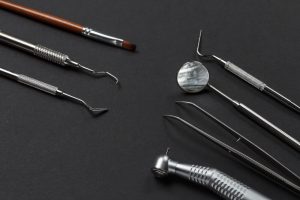
Explorer
Dental explorers examine teeth for tartar, decay, furcations, and other hygienic issues. It’s used to assess the mouth and discover any stand-out problems.
Dental mirror
Otherwise known as a mouth mirror, this device is used to get an indirect view of teeth, redirect light to better see dimly lit parts of the mouth, and magnify hard-to-view parts of the mouth.
Scaler
The ultrasonic scaler is commonly used to remove tartar or calculus from teeth by producing sound vibrations that are inaudible to the human ear.
Air/Water Tip
This instrument injects water and air throughout the mouth in order to clean it.
Syringe
The air-water syringe is something most are familiar with. Dental assistants use it to inject water and air into the mouth.
What Are Common Extraction Dental Instruments?
Any piece of dental equipment that helps to remove and replace a tooth during a procedure.
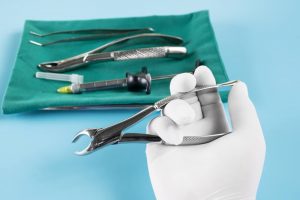
The most common include:
Wilson
It’s used to pry back the gum tissue when performing an extraction.
Forceps
There are two kinds. Cotton forceps are used to grip cotton and transfer material in and out of the mouth. Extracting forceps are used to dig or pull out teeth.
Elevators
While extracting a tooth, elevators are used to pry back the gum tissue and dig underneath the tooth in order to thrust the tooth upward for extraction.
What Are Reconstruction Dental Tools?
Any dental tool used for the purpose of reconstructing, filling, or repairing tooth or gum-related issues.
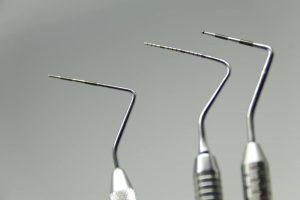
The most common dental tools for reconstruction are:
Plugger
More commonly known as a condenser, this instrument has flat ends made to pack down filling into a cavity.
Carver
Hollenback and amalgam carvers are instruments used for restorative procedures, namely to shape, cut, and contour dental materials.
Spatula
Used to spread, lift and mix sealant materials for dental reconstruction processes.
Amalgam Carrier
A liquid mercury and metal alloy mixture used to fill in cavities.
Hand Piece
It’s a partly mechanized piece of equipment that oscillates at a high speed to help with a variety of functions, like cosmetic procedures, polishing fillings, removing decay, and more.
What Dental Equipment is Used During Dental Surgery?
- Mouth Mirror
- Cotton Forceps
- Periodontal Probe
- Ultrasonic Scaler
- Dental Elevators
- Air Water Syringe
- Sickle Scaler
What Tools are Used by Dental Hygienists?
The tools used by hygienists aren’t so intrusive but are used frequently to clean up teeth and prepare them to be seen by the doctor.
Dental Floss
Floss. It’s simple but important. Plaque clings between spaces of your teeth even after they’ve been cleaned. Proper flossing is the number one way to deter gum disease and maintain a healthy mouth.
Dentist Air Drill
Air drills are used to remove small areas that show early onset tooth decay.
Sickle Scaler
These come in a variety of sizes. The edge is sharp and useful in scraping off large amounts of plaque and tartar deposit buildup on a tooth’s surface.
Probe
Probes look similar to hooks and are used to check the pocket depth around a tooth. Different types of probes detect different types of issues.
Disposable Saliva Injector
It’s a well-known tool, the “spit-sucker.” This dental tool vacuums up any mess through a low-powered suctioning method.
Can I Scrape Off Plaque from My Own Teeth?
Tools like scrapers and other cleaners are not DIY and are only to be used by professionals at the dentist’s office. Doing so without the proper equipment or training could damage your enamel or gum tissue and cause infections.
What’s the Best Dentistry Tool for Preventing Cavities?
Floss, be it waxed, unwaxed, or in the form of a pick, is the best way to deter plaque and tartar buildup. Proper and regular brushing and flossing prevent cavities from forming.
Related Post: How to Use Dental Floss Picks Properly
Visit Northside Dental for Professional Cleanings
Our dentistry staff works diligently and professionally to spot early signs of tooth decay, disease, or damage and prevent it. You can smile brighter. We strive to help you keep your teeth longer. Visit our contact page or call us today at (417) 862-2468 to schedule an appointment with us.

